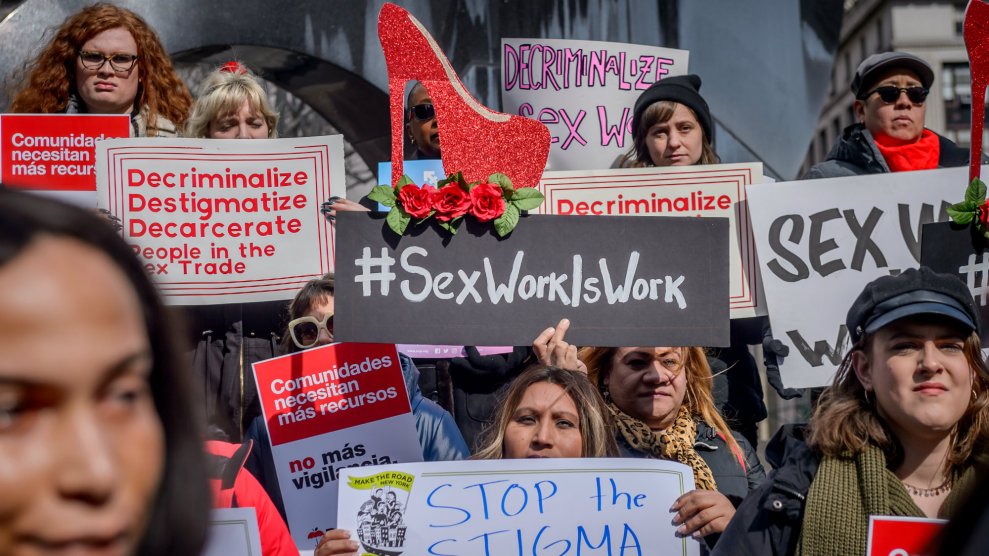
Erik Mcgregor/Zuma
When Julia Salazar, the 28-year-old Democratic Socialist state senator for New York’s 18th district, was campaigning last year, one of her most reliable set of volunteers was a group that has been largely cast out of mainstream political coalitions. Hundreds of sex workers and sex work advocates signed up to canvass for Salazar in the lead-up to the primary election, in which she unseated incumbent state Sen. Martin Malave Dilan.
Salazar made the rights, health, and safety of sex workers a priority for her campaign. “Sex workers are workers, and they deserve to be treated with dignity, including protections and decent working conditions, rather than the abuse and criminalization that they currently face,” she told the Intercept last August. “I’m dedicated to defending workers’ rights, reforming our criminal justice system and ending exploitation, and we know that criminalization puts everyone in sex work at risk rather than protecting them.”
So when New York City’s sex worker activist community started to canvass for Salazar, they reached out to Jessica Raven for advice. Raven—a longtime sex worker rights advocate who was based in Washington, DC, as the executive director of Collective Action for Safe Spaces, a grassroots organization that works to eliminate gender-based harassment—had a lot of experience canvassing for sex workers’ rights. “They modeled it largely off of the canvassing scripts I had written,” Raven says. “So, some strategies that we were using they were able to use that to canvass for Salazar.”
The fight for sex workers’ rights is having a big moment right now, with bills to decriminalize sex work in DC and in New York—the latter, introduced by Salazar, if passed, would make New York the first state to fully decriminalize sex work. (In Nevada, prostitution is legal in only a handful of counties.) A handful of 2020 Democratic presidential nominees have come out in support of it, including Bernie Sanders, Elizabeth Warren, and Kamala Harris. Tiffany Cabán, the 31-year-old progressive public defender who won the Democratic primary for district attorney in Queens last month, pledged not to prosecute sex workers. “We want to support people in sex work who want to engage in sex work because certainly our economy doesn’t work for everybody,” Cabán told BuzzFeed. “Or, if it’s survival work, provide other means where their survival is no longer contingent on sex work.”
The push to decriminalize sex work has become a priority for the progressive movement in the past year. “Full decriminalization is a feminist issue, a prison abolitionist issue, and a labor issue,” wrote Angel Castillo, a member of the Democratic Socialists of America’s Los Angeles chapter, in an op-ed on the group’s national website in December. For sex workers and advocates, this moment is a long time coming. Advocates have been fighting on the margins for the rights and health of sex workers, slowly pushing the needle toward full decriminalization of sex work. It came to a head in April of last year when Donald Trump signed into law the controversial FOSTA-SESTA bills that targeted online sex trafficking, which consequently made it more dangerous for sex workers to conduct business.
When the Sex Worker Advocates Coalition first formed in DC in October 2016, Raven says the group’s first order of business was to figure out what exactly it wanted. “Did we want to work to pursue something we thought was achievable in the short term,” she says, “or did we want to shoot for what we really wanted, which was full decriminalization?”
When the sex workers’ rights movement was still nascent, the idea of advocating to legalize sex work seemed like long shot. So SWAC formed with a small group of advocates and organizations and spent a few months defining its principles. The group had its first major victory by October 2017: DC Councilmember David Grosso—one of the more progressive voices of the District’s 13-member city council—with the coalition’s support and guidance, introduced a bill to decriminalize sex work. It was the first time a politician had introduced the idea anywhere in the country since prostitution was officially legalized in parts of Nevada by the Supreme Court in 1980.
But Grosso’s bill was introduced with only one co-sponsor and ultimately died before it could even get a committee hearing. For Raven and other advocates in SWAC, that moment wasn’t a defeat—it was a rallying cry. “We agreed early on that we should ask for what we want and, even if we didn’t get it in the first year, it would help move us closer,” she says. “And that strategy, looking back, it really worked.”
Along with dozens of advocates, Raven hit the ground running with an intensely coordinated grassroots campaign to make it seem not so radical, to spread the message that sex workers are not criminals and that current laws harm more than help. Advocates canvassed door-to-door in neighborhoods around DC and organized public education and outreach about the misconceptions of sex work.
“We did street art, we did chalking and wheat pasting, we had a rally in June of 2018 for International Whores Day,” Raven recalls. “At CASS, we really centered the experience of sex workers in our advocacy to address gender violence.”
Their efforts paid off: Last month, Grosso, again with SWAC’s support, introduced new legislation to decriminalize sex work. This time around the bill had four co-sponsors. Modeled after similar efforts in New Zealand, the bill repeals “certain criminal penalties” for sex workers and essentially ends the practice of police posing as clients to arrest sex workers, while maintaining laws to prosecute human traffickers. It’s been met with support by Grosso’s colleagues on the council, and he says a full committee hearing is scheduled for the fall, despite promises of opposition by congressional Republicans.
It may seem like this issue “sprung out of nowhere,” says Kate D’Adamo, a sex workers’ rights advocate who serves as a consultant at Reframe Health and Justice, but “it’s literally built on relationships and coalitions that go back 15 years.”
D’Adamo’s advocacy for sex workers began nearly a decade ago as an organizer for the Sex Workers Outreach Project in New York City. At SWOP, she worked with a number of organizations in NYC—the Access to Condoms Coalition, the Red Umbrella Project, Streetwise & Safe—to advocate issues that affected sex workers: providing basic health and safety services and testing and treatment for STDs. But that shifted in 2014, when New York City created a series of special Human Trafficking Intervention Courts (HTICs), which treated everyone arrested for prostitution as if they were human trafficking victims, regardless of whether their status as a sex worker was by voluntary or not.
Sex work advocates like D’Adamo spent time campaigning against the usefulness of the HTICs, noting that, although they were established with good intentions to help victims of human trafficking, HTICs often criminalized people who entered the sex trade by choice. The shift into political advocacy introduced the opportunity to support a new crop of young politicians—like Cabán, Salazar, and Alexandria Ocasio-Cortez—who support the decriminalization of sex work.
“A lot of the bills that are happening right now are built on this history of really strong, well-forged relationships that didn’t just pop up out of nowhere,” D’Adamo says. “And a lot of these relationships that we’ve built organizationally, and with each other, are still really grounding a ton of the work that’s happening.”
The work of these New York City advocates culminated in February with the launch of DecrimNY, a coalition of more than 20 current and former sex workers and allies “seeking to decriminalize, decarcerate, and destigmatize the sex trades” in the state. Raven moved to New York from DC to bring her experience to help launch DecrimNY as member of its steering committee.
It didn’t take long for DecrimNY’s launch to make an impact: In May, nearly 100 advocates spoke to legislators in Albany about their cause, and last month, Salazar and state Sen. Jessica Ramos introduced the Stop Violence in the Sex Trades Act, which would end the criminalization of sex work between consenting adults. Though there’s no indication that the measure will pass anytime soon—the current legislative session has already ended, and Gov. Andrew Cuomo has remained silent about his support of it—advocates say it’s a crucial first step for the path to decriminalization.
D’Adamo points to last year’s controversial FOSTA-SESTA legislation taking effect as a big impetus for today’s moment in sex workers’ right. The controversial bills—the Allow States and Victims to Fight Online Sex Trafficking Act and the Stop Enabling Sex Traffickers Act—outlawed online sex trafficking, effectively shutting down Backpage and the parts of Craigslist where sex work was advertised. That pushed sex workers back on the streets, where they aren’t able to screen clients as potential safety threats, negotiate rates, and arrange meeting locations.
“I don’t want to give Donald Trump credit for anything, but I think that this wave of organizing is really surfacing a lot of conversations that have been very pertinent to a lot of us for a very long time,” D’Adamo says. “It takes a big cultural moment to unveil some of these things.”
Alice Miller, a Yale Law School professor and the co-director of the university’s Global Health Justice Partnership, who has studied sex work for nearly 30 years, also says FOSTA-SESTA “galvanized and brought new attention” to the push for sex work decriminalization, but thinks it goes much deeper than that. “A lot of what’s giving an impetus is that people started to be able to organize around the idea of harm reduction and anti-policing,” she says. An increased focus on criminal justice reform, thanks to activist movements like Black Lives Matter, has helped sex worker advocates gain visibility. “There have been a set of feminist sex worker organizers who were anti-oppression organizers from way back, but they never had much of a base, but now there is a connection,” Miller says.
For his part, Grosso says it just “takes time for people to understand this issue in a meaningful way.” He points to the path to marijuana decriminalization and legalization as a point of comparison: Washington and Colorado became the first states to legalize the recreational use of cannabis in 2012 and, since then, it has been legalized in 11 states and DC. “These things take time, and my office takes a very strict human rights framework approach to all the policies we put forward,” Grosso says. “And this one, I think, just screams out for an approach that is based in a harm-reduction model that does more for helping people who engage in sex work than arresting them.”
In May, DecrimNY partnered with Data for Progress, a progressive think tank, to conduct a nationwide poll among voters about decriminalizing sex work and found that Democratic voters supported it by a 3-to-1 margin.
Over the past few months, several top Democratic 2020 candidates have made lukewarm statements of support for decriminalizing sex work. In an interview with The Root, Harris said she is open to decriminalization, despite her support of FOSTA-SESTA, while Sanders’ campaign told Vice that the Vermont senator “believes that decriminalization is certainly something that should be considered.” Warren, who along with Sanders endorsed Cabán in the Queens DA race, told the Washington Post she’s “open to decriminalization.”
But even with this current moment for sex workers rights, advocates are still skeptical of the presidential candidates voicing support. Raven says that Sanders’, Warren’s, and Harris’ comments supporting sex work decriminalization have been frustratingly vague, “but we’ll take it, because it’s still in the national spotlight and people are talking about, which is not where we were three years ago.”
















